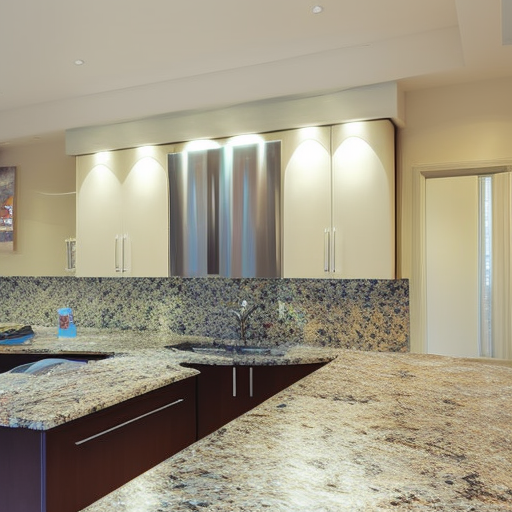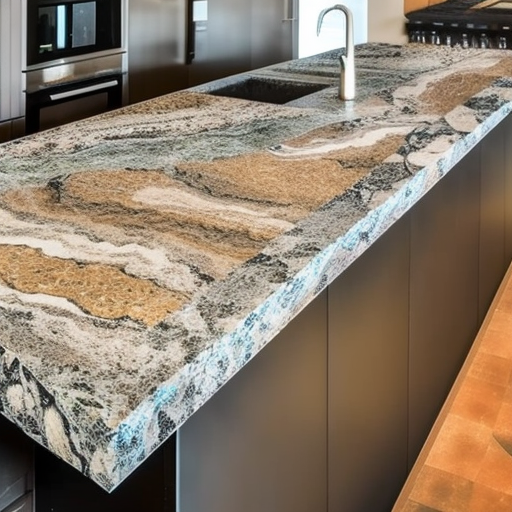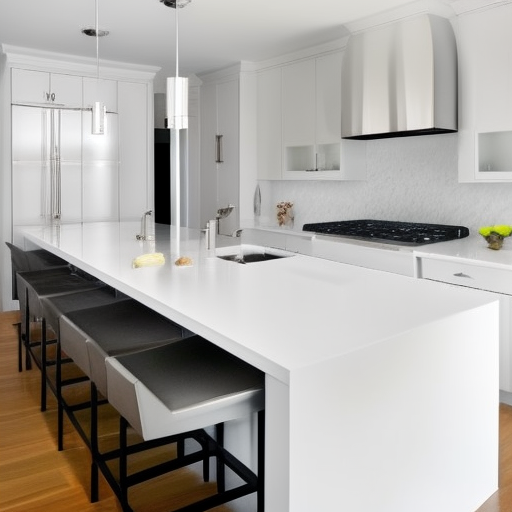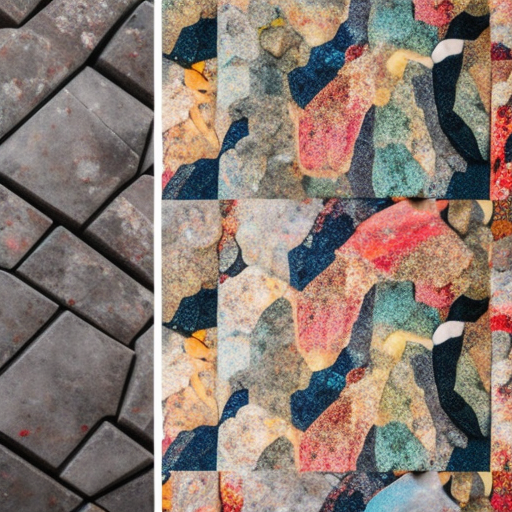Are you in the market for a new countertop but unsure which material to choose? Look no further than this comprehensive comparison of granite and quartz countertops. In this article, we will delve into the pros and cons of each material, analyze their durability and maintenance requirements, and ultimately help you make the perfect choice for your home. So, if you’re ready for a granite vs. quartz showdown, keep reading to discover which countertop reigns supreme.
1. “Granite vs. Quartz: A Comprehensive Countertop Comparison”

When it comes to selecting the perfect countertop material for your kitchen or bathroom, two options that often come into consideration are granite and quartz. Both granite and quartz have their unique characteristics and advantages, making it essential to compare them comprehensively before making a decision.
Granite, a natural stone formed through the cooling and solidification of molten magma, is renowned for its stunning beauty and durability. It is available in a wide range of colors and patterns, making it a versatile choice for any style of kitchen or bathroom. Granite countertops are known for their heat resistance, making them an ideal surface for cooking and baking. Additionally, granite is highly scratch and stain resistant, making it a low-maintenance option for busy households.
On the other hand, quartz countertops are engineered stone surfaces made by combining natural quartz crystals with resins and pigments. This process creates a non-porous and highly durable material that is resistant to stains, scratches, and heat. Unlike granite, quartz countertops do not require sealing, making them virtually maintenance-free. Quartz countertops also offer a wider range of colors and patterns than natural stone, allowing homeowners to achieve the exact look they desire.
When comparing granite and quartz, it is important to consider factors such as durability, maintenance, and aesthetics. Granite countertops have a natural beauty that cannot be replicated, with each slab being unique in its color and pattern variations. Quartz, on the other hand, offers a more consistent appearance, making it easier to match with other elements in the kitchen or bathroom. Both materials are highly durable and resistant to heat and scratches, but quartz has the edge in terms of stain resistance due to its non-porous nature.
In terms of maintenance, granite countertops require periodic sealing to prevent staining and should be cleaned with mild soap and water. On the other hand, quartz countertops are virtually maintenance-free and can be easily cleaned with regular household cleaners. However, it is important to note that quartz is not as heat resistant as granite and may be prone to damage from hot pots and pans.
In conclusion, choosing between granite and quartz countertops ultimately depends on your personal preferences and needs. If you value natural beauty and uniqueness, granite may be the ideal choice for you. However, if low-maintenance and a wide range of design options are your priorities, quartz may be the superior option. By considering factors such as durability, maintenance, and aesthetics, you can make an informed decision on which countertop material reigns supreme in your home.
2. “Understanding the Pros and Cons of Granite and Quartz Countertops”

When it comes to choosing the perfect countertop material for your kitchen or bathroom, granite and quartz are two popular options that often reign supreme. Both granite and quartz countertops offer a unique blend of durability, beauty, and functionality. However, it’s important to understand the pros and cons of each material before making a final decision.
Granite countertops, made from natural stone, have long been a favorite among homeowners and designers. One of the biggest advantages of granite is its natural beauty. Each slab of granite is unique, with its own patterns and colors, making it a stunning addition to any space. Additionally, granite countertops are highly durable and resistant to heat, scratches, and stains. They require minimal maintenance and can last for decades with proper care.
On the other hand, quartz countertops are engineered stone surfaces that are composed of around 95% natural quartz and 5% polymer resins. One of the main advantages of quartz countertops is their non-porous nature, which makes them highly resistant to stains and bacteria. Unlike granite, quartz countertops do not require sealing and are easy to clean with just mild soap and water. Additionally, quartz countertops offer a wide range of color options, allowing for greater design flexibility.
While both granite and quartz countertops have numerous advantages, they also come with a few drawbacks. Granite countertops, being a natural stone, can be more prone to chipping or cracking if subjected to heavy impact. Additionally, granite requires periodic sealing to maintain its resistance to stains and water absorption. On the other hand, although quartz is highly durable, it can be more susceptible to damage from extreme heat. Placing hot pots or pans directly on quartz countertops can cause discoloration or even lead to cracks.
In conclusion, the choice between granite and quartz countertops ultimately depends on personal preferences and specific needs. Granite offers natural beauty and durability, while quartz provides a non-porous surface and a wide range of color options. Consider factors such as maintenance, budget, and design preferences when making your countertop decision. With proper care, both granite and quartz countertops can be a long-lasting and stylish addition to any kitchen or bathroom.
3. “Analyzing the Durability and Maintenance of Granite and Quartz Countertops”

When it comes to choosing the perfect countertop material, durability and maintenance are two crucial factors to consider. Both granite and quartz countertops are renowned for their strength and longevity, making them popular choices for homeowners. Let’s take a closer look at how these materials stack up in terms of durability and maintenance.
Granite is a natural stone that is highly durable and resistant to scratches, heat, and stains. This dense material can withstand heavy use, making it an excellent choice for busy kitchens. However, it is still important to use cutting boards and trivets to protect the surface from potential damage. Additionally, granite countertops may require periodic sealing to maintain their resistance to stains and spills.
On the other hand, quartz countertops are engineered stone surfaces made by combining natural quartz with resins and pigments. This manufacturing process results in a highly durable and non-porous material that is resistant to scratches, heat, and stains. Unlike granite, quartz countertops do not require sealing, making them a low-maintenance option. They are also less prone to chipping or cracking, making them an ideal choice for households with children or in high-traffic areas.
While both granite and quartz are durable, proper maintenance is essential to prolong their lifespan. For granite countertops, it is recommended to clean them regularly with a mild detergent and warm water. Avoid using harsh chemicals or abrasive cleaners as they can dull the surface. Additionally, periodic resealing may be necessary to ensure the countertop remains resistant to stains and moisture.
Maintaining quartz countertops is relatively easy. They can be cleaned with a mild soap and water solution or a non-abrasive household cleaner. However, it is important to avoid using bleach or any acidic cleaners as they can damage the surface. Unlike granite, quartz countertops do not require sealing, saving homeowners the hassle and cost of regular maintenance.
In conclusion, both granite and quartz countertops offer exceptional durability and require minimal maintenance. Granite is a natural stone that is known for its strength and heat resistance, whereas quartz is an engineered stone that boasts non-porous properties and superior durability. Ultimately, the choice between these two materials comes down to personal preference, budget, and the specific needs of your household. Regardless of your decision, both granite and quartz countertops will undoubtedly add beauty and functionality to your kitchen or bathroom space.
4. “Choosing the Perfect Countertop: Granite vs. Quartz Showdown”

Choosing the Perfect Countertop: Granite vs. Quartz Showdown
When it comes to selecting the ideal countertop material for your kitchen or bathroom, two popular options often come to mind: granite and quartz. Both materials offer durability, beauty, and a wide range of design options, making it difficult to determine which one reigns supreme. In this granite vs. quartz showdown, we’ll compare these two contenders in terms of their appearance, maintenance, durability, and cost to help you make an informed decision.
First and foremost, let’s discuss the appearance of granite and quartz. Granite, a natural stone, is known for its unique patterns and variations, making each countertop one-of-a-kind. It offers a timeless and elegant look that can enhance the overall aesthetic of any space. On the other hand, quartz countertops are engineered using a combination of natural quartz crystals and resins, resulting in a more consistent and uniform appearance. Quartz countertops can be manufactured in a wide array of colors and patterns, allowing for greater design flexibility.
Maintenance is an essential factor to consider when choosing a countertop material. Granite countertops require regular sealing to prevent staining and bacterial growth. However, with proper care and maintenance, granite can withstand heat, scratches, and daily wear and tear. Quartz countertops, on the other hand, are non-porous and do not require sealing. They are highly resistant to stains, heat, and scratches, making them a low-maintenance option for busy households.
Durability is another crucial aspect to weigh when comparing granite and quartz. Granite is a natural stone, known for its exceptional durability and ability to withstand heavy impacts. It is resistant to chipping and cracking, ensuring its longevity. On the contrary, while quartz countertops are also highly durable, they may be more prone to heat damage compared to granite. Placing hot pans directly on quartz surfaces may cause discoloration or even cracking, so it’s important to use heat-resistant pads or trivets to protect the countertop.
Cost is often a deciding factor for many homeowners. Granite countertops are generally less expensive than quartz, as the latter requires more complex manufacturing processes. However, it’s important to consider the long-term investment and durability of the countertop. While quartz may have a higher upfront cost, its low-maintenance nature and resistance to damage can make it a cost-effective choice in the long run.
In conclusion, both granite and quartz have their own unique qualities and advantages. The choice between these two materials ultimately depends on your personal preferences, budget, and lifestyle. If you value natural beauty and are willing to invest in regular maintenance, granite might be the perfect choice for you. On




